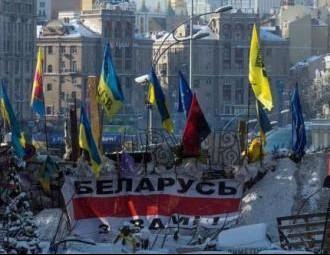Valiantsin Akudovich: Belarus didn’t have Maidan as the regime has more opportunities for repression

Why Belarusans travel to Maidan in Kiev, and what is the difference between the situation in Belarus and Ukraine?
EuroBelarus Information Service discussed Ukrainian and Belarusan experience with Valiantsin Akudovich, the philosopher, writer and culture expert.
- Why Belarusans travel to Maidan in Kiev? What do they miss?
- Kiev is the destination of those who miss Maidan in Belarus.
- Why not to organize Maidan “at home”? Is it that Belarusans don’t want to be in the EU?
- With the situation in the country everyone is well aware that no Maidan is possible in Belarus. Those, who have the courage to go into the street, will be arrested 15 minutes after; thus, the scenario of “Square 2006” or “Square 2010” will be repeated.
The policy of consistent and systemic terror can suppress anyone. If someone like Lukashenka came to Ukraine immediately after Kravchuk and started the same strategy as in Belarus, Ukrainians would not have Maidan in spite of their independent freedom-loving past and Western Ukraine. Besides, under Stalin’s rule Western Ukraine was as silent as the Eastern. And those who didn’t keep silent ended up in Siberia.
- Haven’t you had a desire to at least have a peek at Maidan or to be at the centre of events?
- I had an impulse to attend the first Maidan and didn’t have any desire to travel to Maidan this year. In our contemporary history of protest movement we have Zacharanka (the former Minister for Internal Affairs who disappeared in 1999 – EuroBelarus), we have thousands of arrests during and following the events of 2006 and 2010. Maidan didn’t happen in Belarus only because the regime had bigger opportunities for repressions. And any attempt to make a similar mass protest was toughly suppressed.
There was only one interesting episode during Square-2006, the secret nobody has opened yet: why did the authorities allow the demonstrators to have their camps for the whole three nights, and riot police didn’t destroy those camps 15 minutes after? It has nothing to do with the courage of the people, who have been there.
- Could the presence of European observers be the reason?
- Have a heart! They also violated our laws. We should discriminate between the fantastic night with lots of people after the elections, and the nights with few people with camps. I attended that Belarusan “Maidan”.
- What do you think about the future that awaits Ukraine?
- Well, I’m no soothsayer. There is hard and complicated road that lies ahead of Ukrainians. There are different reasons for that: Ukraine is much less united than Belarus; it has to act as one to become one nation, and Maidan plays important role in this process.
On the other hand, Ukraine has something we don’t have: political culture as a part of democracy, though it is a democracy with oligarchical character. There are acting parties, real parliament, a lot of independent Media, freedom of protests and freedom of resistance – all that Belarus still has to acquire.
Let me note that when it comes to political culture, Russia lags behind Ukraine even more than Belarus. Russia is more economically developed than Ukraine; but politically, Ukraine is way ahead Russia and Belarus.
- Whom do you have a leaning to among Ukrainian opposition politicians?
- For some time I have been giving preference to Klitchko. But I follow events rather than Ukrainian opposition leaders; so I can’t say who seemed most worthwhile among them.
Let me be honest: I start my day with the information from Ukraine and do the same thing before I go to bed. However, I feel that I don’t understand the motive force of all this.
I try to look at Maidan with the eyes of Ukrainians, so here is my conclusion: if Yanukovich announced pre-term elections today, I don’t exclude his victory, even if the elections are democratic. Thus, assessing the situation in Ukraine, let us not be obscured by Maidan.
-
03.01
-
07.10
-
22.09
-
17.08
-
12.08
-
30.09








































